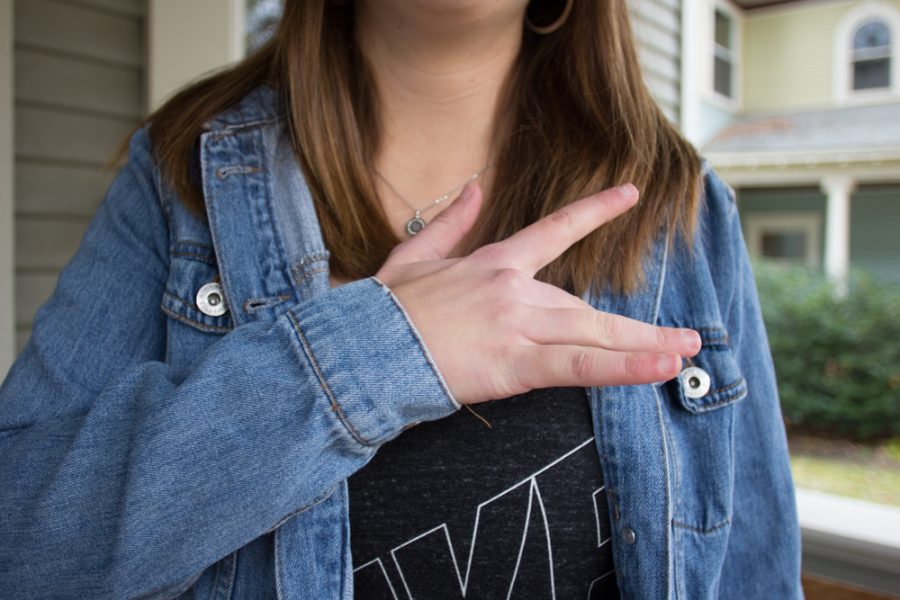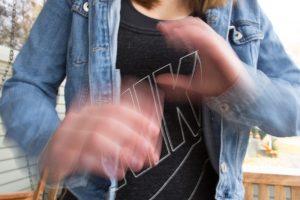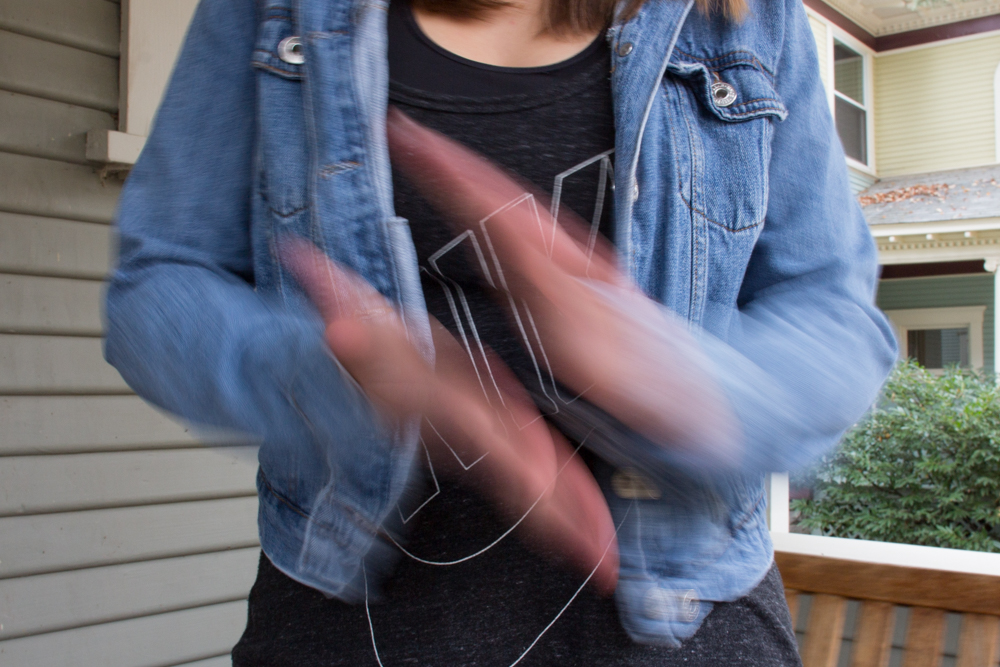Hard of Hearing, but Not of Listening
On being hard-of-hearing at Whitman
November 13, 2017
When Lola Albarral Bravo and her deaf brother go to the disco, she can hear the music to some extent and her brother cannot. He is still the best dancer, though. He feels the vibrations in the floor, and from these, he senses the feeling of the song. Instead of inhibiting him from enjoying the experience, other senses work to create an experience hearing people could never have.

Deafness is often misunderstood and the effects of this can be seen though Albarral Bravo’s experience with her professors and peers at Whitman and throughout her life. Deafness, rather than being viewed as a disability or something someone should be frightened of, should be viewed simply as a quality.
Lola Albarral Bravo, a sophomore international student from Spain is hard of hearing, but not totally deaf. Growing up in a family of both deaf and hard of hearing family members, it has always been important to have the ability to interact and communicate in both cultures. This is because within the deaf community, there is much controversy over learning to speak when those in the hearing world often do not attempt to learn sign language.

“I have met deaf people who don’t want to learn how to speak because they say that the hearing people don’t make the effort to learn sign language,” Albarral Bravo said. “But from my perspective, I think that it’s important for everyone to know sign language and spoken language, but also we need to realize that there are very few deaf people in the world. Not a high percent of hearing people know what being a deaf person is like. So from my perspective, it’s important for deaf and hearing people to learn both languages: speaking and sign language, so they can communicate with more different people.”
The best approach to interacting with hard of hearing individuals is often misunderstood within the Whitman community and the broader world. Albarral Bravo said that by understanding deafness and giving training to members of the community, the deaf and the hearing world would be able to better interact.

Albarral Bravo was taught to speak and sign early on by her parents who believed that it was important to raise their daughter not in a completely deaf environment due to the barriers this could create. Without learning to communicate with hearing people, they worried that many she would face many barriers.
“So my mom and my dad, they took me to a normal school. In secondary there were some deaf people but they didn’t want to be with hearing people because of the fact that they were marginalized–they were stigmatized. And that is true, but that’s because they didn’t have the perfect education to speak well, so people made fun of them.”
Lola said that this stigma sometime stems from a lack of understanding of the struggle of lip reading; often unpronounced facial movements also leads to discrimination.

Being one of the only hard of hearing student in her classes growing up and currently at Whitman has come with a lack of understanding of deafness by her instructors and peers. One misunderstanding that has occurred is confusion about her voice, which is slightly different than hearing peoples due to learning to speak without a full percentage of hearing.
“I have been bullied because of my voice. I had a lot of bullying when I was ten years old to fourteen years old because I know I don’t have a normal voice, but people don’t understand it’s hard for us to speak,” Albarral Bravo said.
Albarral Bravo said the ignorance of others about deafness has led to frustrating and hurtful situations. Upon her first day of secondary school, Albarral Bravo was placed in special support classes without her approval and with no proof of academic struggle. Behind this placement was the assumption that deaf people do not hold the same level of intelligence as others.
“I was raised as a normal student. They sent me to supportive classes on the first day of secondary school without asking me. That is discrimination,” Albarral Bravo said.
Albarral Bravo said not to assume the needs of people who are hard of hearing and deaf, but to ask what works best for them.
“First always ask, then provide accommodation,” Albarral Bravo emphasizes.
Albarral Bravo said microaggressions towards hard of hearing people are commonplace, things like giving up speaking after two times, using others to translate and the practice of screaming in a misguided attempt to help them understand.

“If I don’t understand something after two times, just write it down. Is it so hard for you?” Albarral Bravo said. “When you do that it hurts me, because I feel that I’m giving you more work.”
Shown in the shift from the use of the term hearing impairment or disability to the use of hard of hearing, Lola emphasizes that being deaf is not a impairment, but rather a characteristic of an individual that can often enrich their communication skill and observation of social interactions.
“I can analyze the gestures of people. I can know what they think without them telling me. I can also read their lips. I can speak through sign language. I know things that others will never know,” Albarral Bravo said.
One common misconception surrounding sign language is that all deaf individuals around the world speak the same language. Just like spoken language, many countries speak different languages of sign language. Lola grew up signing Spanish Sign Language and is currently learning some American Sign language (ASL). In order to have a common mode of communication around the world, the language called International Sign was created.
Haley King Learned ASL in high school and is still passionate about developing her skills. She explained how ASL uses unique methods to express ideas.
“It utilizes a completely different method of communicating from spoken and written languages–in this way, it’s arguably more foreign than French might be to a native English speaker!”
Albarral Bravo says she strongly believes that more steps should be taken to educate others about how to interact with people with hearing loss and deafness in academic and social settings.
Emma Saas, who learned sign language in high school, emphasized the importance of educating yourself about deaf culture.
“You don’t really understand, and I can’t fully either because I’m hearing, but there is a significant oppression of deaf people and a misconception of what people can and cannot do,” Saas said.
“I feel like not only here … in other places that I have studied, many faculty members don’t know how to talk to students who have a disability. I have met professors who were very nervous because they didn’t know how to communicate very well with other students. And I want the faculty members and the students to have training so they can know how to talk to a deaf student. A deaf student is not something to fear, it’s not something scary, you only need to speak more clearly,” Albarral Bravo said.
She emphasized that the lack of training and resources, due to Whitman’s size and remoteness, can make it difficult for students with hearing loss to participate to their fullest potential at Whitman.
“I feel some barriers here, for example, I would never go to a conference here because I would never understand what a speaker is saying,” Albarral Bravo said.
In class Lola is provided with a transcriber, however the closest interpreter lives an hour from Whitman, making it hard for her to attend large events and talks.
This lack of resources at Whitman, for Albarral Bravo, is an explanation for why more deaf students do not attend Whitman. Lola said that Whitman does try to offer resources such as note takers in her class, however Whitman’s smalls size makes it hard. Some resources that Albarral Bravo believes would be ideal are: the presence of professionals trained in working with deaf and hard of hearing people, giving faculty training, and a consistent availability of interpreters or transcriptions at lectures.
“I think that is why there are not more deaf students here, because deaf students go where they have resources. Here we don’t have resources,” Albarral Bravo said.
As a result of the lack of resources, Lola is the only hard of hearing student attending Whitman. While other marginalized groups can use each other’s shared experiences as a support system, no such community exists for deaf students.
Albarral Bravo explained, “If you are a person of color here or an international student, you can come together with people who share the same experiences with you, but I don’t have anyone here who has shared the same experience as me.”




